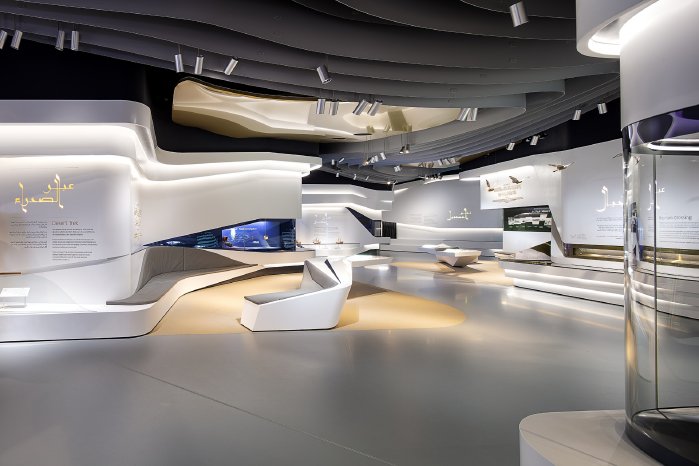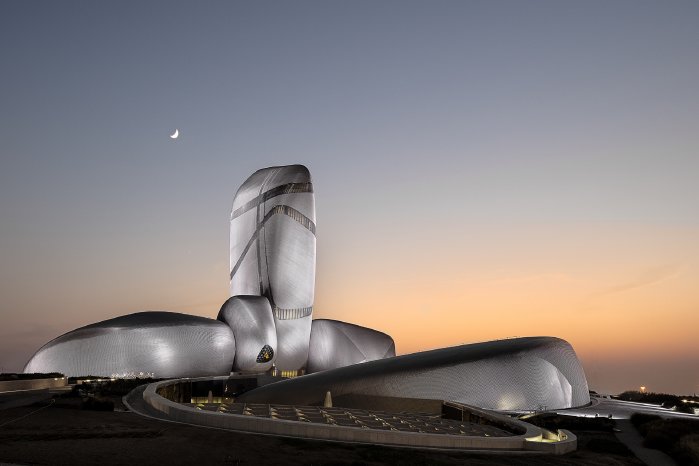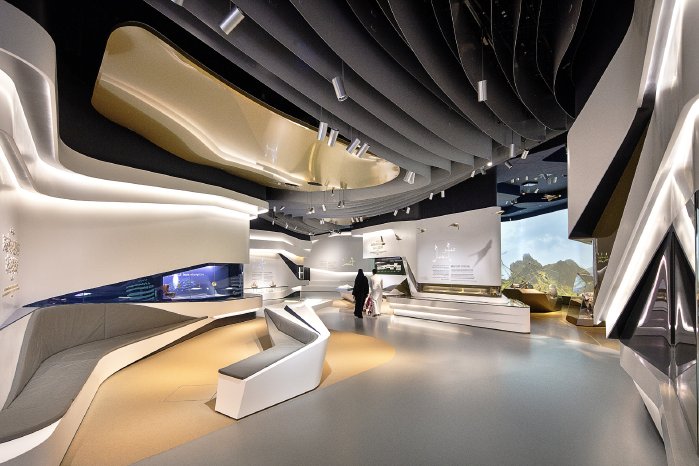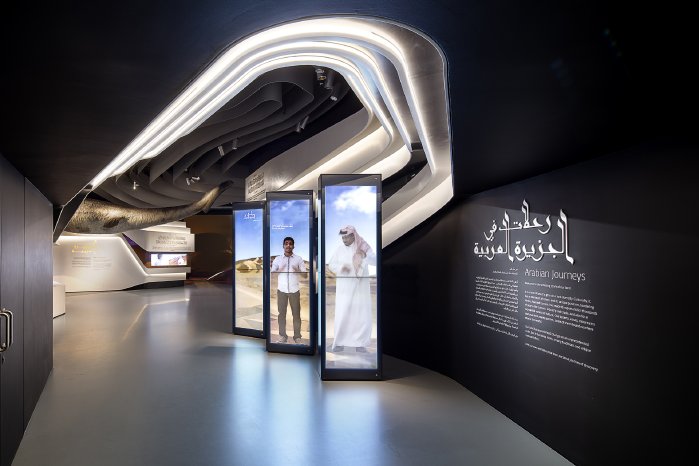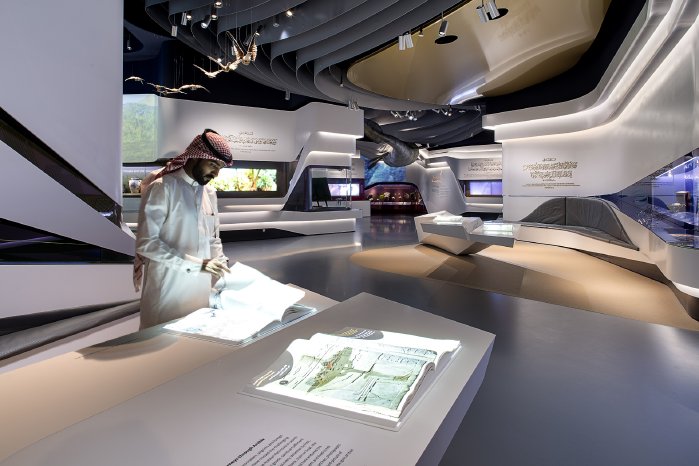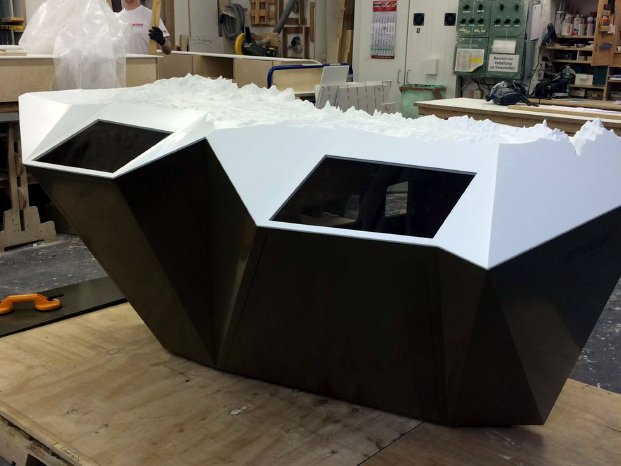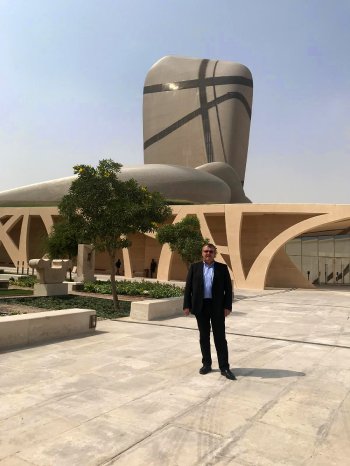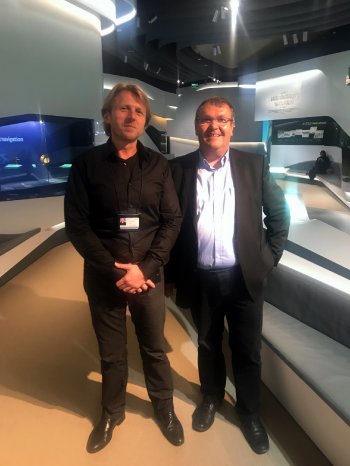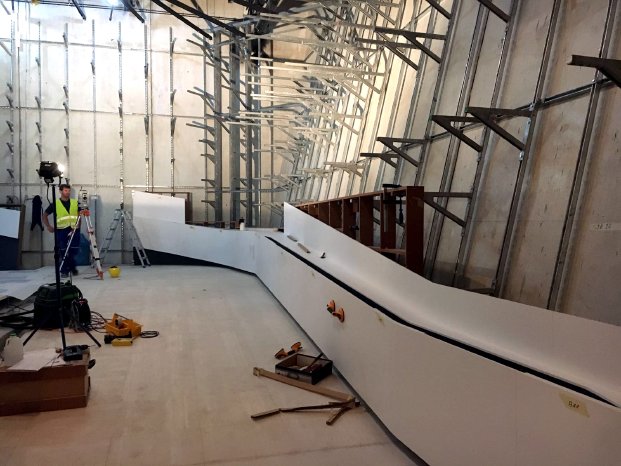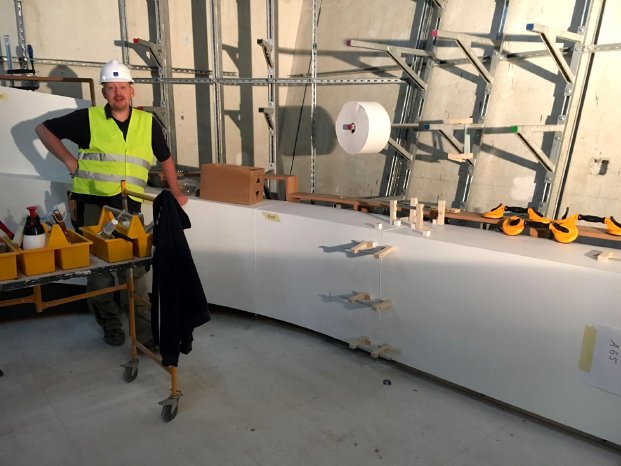The winning design for the building dates back to 2007 and was created by the Norwegian architectural firm Snøhetta. The head of state laid the foundation stone on 20 May 2008. After a construction period of 10 years, the centre is now completed in all its glory.
For the museum design in the Gallery 4 exhibition area, the Brueckner studio in Stuttgart, Germany, was responsible for general planning, the concept for the exhibition and design as well as scenography. As in the classic of world literature "A Thousand and One Nights", Brueckner staged many unique stories on the origin, geography, nature, economy and culture of Saudi Arabia in Gallery 4. Rosskopf + Partner AG in Obermehler, Germany, was given the responsibility by the British museum outfitter Beck Interiors Ltd to effectively implement the interior design and the unusual exhibition furniture made of solid surface material. The Thuringian solid surface material specialist awarded the design and overall project management for the implementation to the Dresden-based company 5D Engineering GmbH.
With eight thematic zones, the exhibition rooms of Gallery 4 present the bridge between past, present and future of Saudi Arabia. The different time axes are linked by means of a curved wall cladding, so-called Ribbon Walls (wall projections), from large-scale bands of solid surface material. The geometry with its organic shapes is a special feature: the entire installation has almost no right angles. At the same time, the parts manufactured by Rosskopf + Partner merge smoothly and coherently with the elements of other tradecrafts.
The homogeneous wall coverings were created from hundreds of individual elements made of solid surface material. They combine harmoniously with upholstered leather seat elements and handrails made of coloured solid surface material. Projections protrude into the next thematic zone as edgeless transitions. For this purpose, a total of more than 900 m² of raw solid surface material was processed. For the substructures of the walls made of 440 panels, the Rosskopf + Partner team used flame retardant MDF material in B1 quality. The bending parts made of solid surface material are meticulously connected to these panels.
With indirect LED lighting and diffusers made of fabric strips, the organic lines of the solid surface material ribbons are accentuated easily and playfully. Thus, almost all wall and ceiling surfaces with gradation are indirectly illuminated. Light boxes, showcases and coloured pedestals were added appropriately in the ribbons of material in the wall for each theme room.
Based on a sophisticated construction design, the solid surface material specialists also produced exclusive exhibition furniture, such as seating, topographic models and impressive presentation elements.
The "Mountain Topography" model shows, for example, the topography of Saudi Arabia. Even during the production of the mould itself, the exhibition table required significant expertise and craftsmanship. The requirement was for the relief to look like a single piece of material. Many material sheets of the same colour were glued over each other and processed so that no milling marks are visible.
Three monitors were precisely fitted to allow visitors to interactively communicate on the dynamically shaped RFID table. The two wings of the table protrude far beyond the pedestal, and still, the ends were to remain stable. For this purpose the substructure was statically calculated. For quick service access, a curved inspection flap is integrated on the underside of the table.
Similar demands were made for the construction of the so-called "Scrapbook Table". Different pages are projected onto a thermo-formed open book. The connection between the white surface and the base made of dark solid surface material are designed with no gaps and with flowing edges. Leather-covered seats integrated into the object invite you to linger.
The Central Interactive Table "Into the Future" with changing materials and colours between the top surface and the side surfaces serves as a surface for the projection of various scenarios of the future. Various technical elements were installed with precision in the furniture. Light installations and fans that simulate wind, with flowing material transitions were incorporated in "Reading the Landscape" or "Shifting Sands". They provide the interactive installations with a dynamic external design language.
For the individual exhibition areas, all manufactured parts were initially assembled, disassembled, and then precisely labelled in Obermehler, Germany for final assembly in Saudi Arabia. For the first inspection, a delegation from the Saudi Arabian client travelled to Thuringia. A complete exhibition zone was set up in a hall, recalls Michael Peterseim, who from the beginning belonged to the project team at Rosskopf + Partner. "The customers were so impressed with the presentation and so enthusiastic about our ability that it was sufficient from then on so that all subsequent proposal acceptances could be accomplished with photos and by telephone," he recalls.
113 large special pallets with all parts were sent on their way from Obermehler and shipped in 15 containers to Saudi Arabia.
Michael Peterseim and his assembly team put together the gigantic puzzle in Gallery 4 in a total of 24 weeks. All individual parts had to be joined to the nearest millimetre, which was not always easy considering the air conditioning system that was not yet fully functional and the resulting temperature fluctuations. Variations that were too large would have caused cracks in the joints.
He describes the cooperation of the mostly European-based companies in Dhahran as very exciting and very collegial. There were benefits from their mutual knowledge. "A Belgian team wanted us to disassemble our solid surface parts to install a curved glass. But we found a way together, because it worked without dismantling"; he is still excited about this final phase of the project.
Michael Schob of 5D Engineering described the most challenging tasks, because of the elaborate size of the project, as the related coordination with the client, the preparations for assembly in Germany, and the installation in Saudi Arabia itself. At the beginning of the project, the most technically challenging task was implementing the design of the 3D surface model into buildable and mountable single segments. For assembly, the design expert developed a new system of calibration especially for this project. "With three fixed points, it is possible to position components in free space with millimetre accuracy and to fit them precisely," explained Michael Schob, who accompanied the installation over the entire duration of the project.
Rosskopf + Partner AG is very proud that its expertise in museum construction was able to contribute to this gigantic project in the desert state. Helmut Rosskopf, CEO of Rosskopf + Partner AG, sums up the project: "The outstanding craftsmanship of our employees was once again spurred on by one of the most spectacular projects in our company’s history. The team led by Michael Schob of 5D Engineering and Michael Peterseim from our company mastered it with flying colours and has surpassed itself." The awarding authority also agrees with this assessment.
Jens Kolm was responsible for all aspects of Saudi Aramco's construction during the construction phase. "I'm very proud of this project," he said after completing Gallery 4 – Arabian Journeys. He praised the implementation by saying "The Rosskopf + Partner team has made a significant contribution to transforming the planners' ambitious innovative ideas into reality. The solid surface work is a benchmark in modern interior design and shows the high aesthetic understanding and craftsmanship of the Thuringian specialists.”
For Gallery 4 in the King Abdulaziz Centre, Rosskopf + Partner used solid surface material exclusively. The material consists of an acrylic compound, bonded with natural minerals (about 75 percent) and colour pigments. It is easy to process and extremely durable. Thanks to its non-porous structure, it is easy to clean and scratches can be removed over and over again by sanding it. This makes solid surface material the first choice for planners and architects in museum construction.
The Project in Numbers:
Production period:
1 year
Assembly time:
24 weeks
Substructures for the walls:
440 MDF boards in B1 quality
Material:
Solid Surface Material
approx. 900 m² (490 sheets) raw material
318 bending moulds
Transport:
13 40-foot containers and 2 20-foot containers
113 special pallets
Project Participants:
Awarding Authority
Saudi Aramco
P.O. Box 5000
Dhahran 31311
Saudi Arabia
Architect / Planner
ATELIER BRÜCKNER GmbH
Krefelder Strasse 32
70376 Stuttgart
Germany
+49 711 500077-0
atb@atelier-brueckner.com
Client / General Contractor Interior Design
Beck Interiors Ltd.
Victory House
Cox Lane
Chessington
Surrey KT9 1SG
United Kingdom
+44 20 8974 0500
mail@beckinteriors.com
Construction / Project Management
5D Engineering GmbH
Moritzburger Weg 67
01109 Dresden
Germany
+49 351 883410-0
info@5d-engineering.com
For any further questions please contact:
Rosskopf + Partner AG
Marketing
09573 Augustusburg-Hennersdorf
Germany
+49 37291 25-0
info@rosskopf-partner.com
Press Contact and File Copy:
P3N MARKETING GMBH
Bernhardstrasse 68
09126 Chemnitz
Germany
+49 371 5265-380
info@p3n-marketing.de
